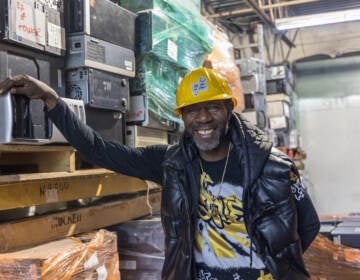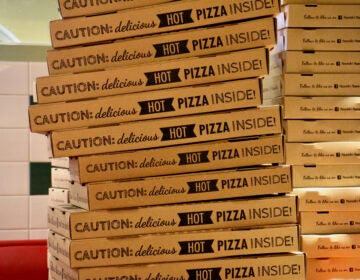This Philly business wants to pack your holiday orders in trash
Feeling guilty about all the plastic, cardboard, and styrofoam your online orders come in? A craft supply business in Philly is trying to solve the problem.
Listen 5:42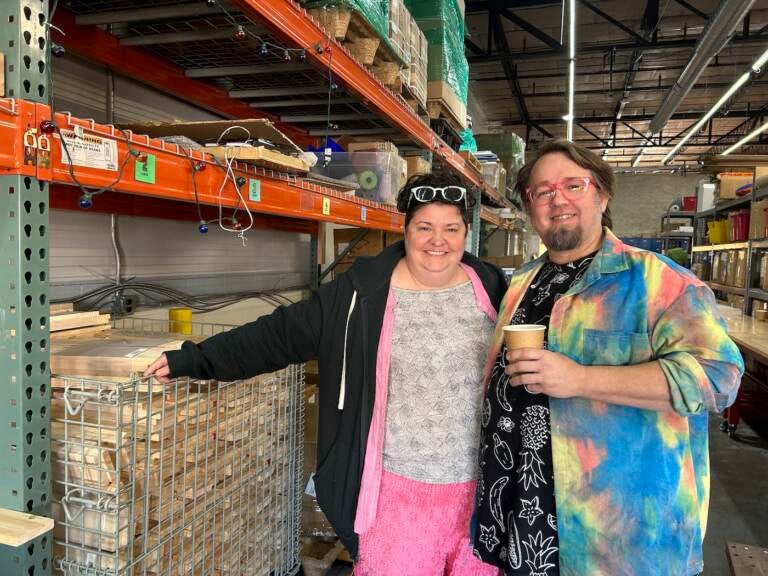
Tiernan Alexander (left) and Tim Eads, co-owners of Tuft the World, at their warehouse in Southwest Philly. (Sophia Schmidt/WHYY)
If you’ve done a lot of your holiday shopping online, you may feel a little guilty about all the plastic, bubble wrap, packing peanuts, and cardboard packing your purchases. The good news is, there’s a small business in Philadelphia trying to solve the problem of packaging waste.
“Best case, you put it in recycling. Worst case, it just goes in the garbage,” said Tiernan Alexander, co-owner of Tuft the World, a small craft supply company based in Southwest Philly. “So we’ve been always looking for solutions.”
Tuft the World sells materials for tufting. It’s a way to make rugs using a ray gun-like machine that punches yarn into a backing fabric. You can get really creative with it — and make pillowcases, fuzzy frames for mirrors, or wall hangings.
Alexander started Tuft the World with her partner, Tim Eads, in 2018. When the pandemic hit, the business took off.
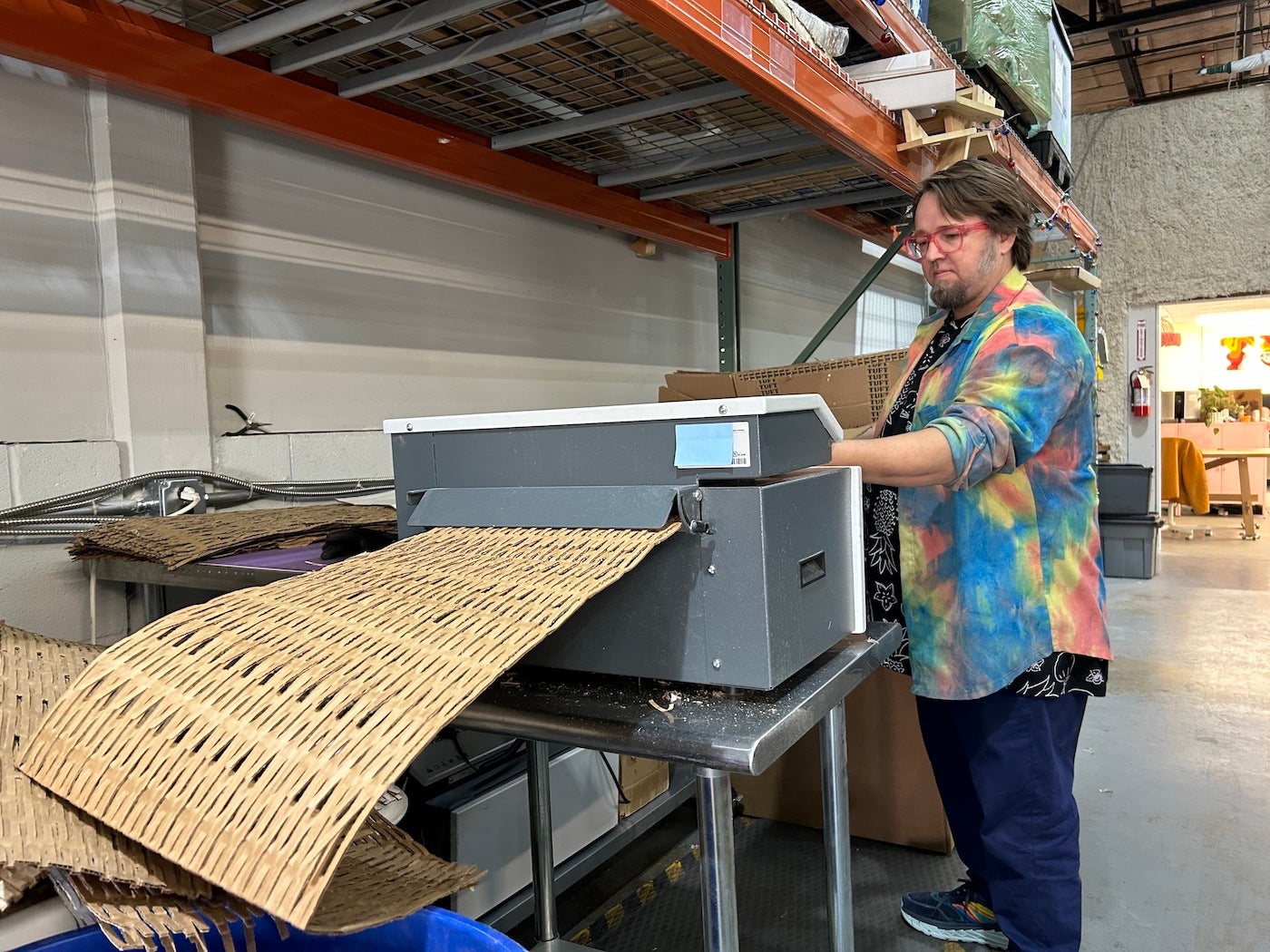
“We got really lucky,” she said. “We hit it right at the right time and it kept growing from there. We kept being able to grow, and grow, and grow.”
The business now operates out of two warehouse spaces in the same building in Philly and a fulfillment center in Canada. It has roughly 20 employees.
From the start, the couple knew they wanted their business to have as small of a carbon footprint as possible. Part of that is environmental sustainability.
“We import things from all over the world. That uses up an enormous amount of carbon,” She said. “We heat and cool our spaces so that everyone is comfortable. That uses a ton of electricity. So we know that we can’t be a perfectly sustainable company. So it becomes even more important that everywhere that we can, we do.”
So the business sources recycled yarn made of scraps from the T-shirt industry, it composts food waste in the office, and buys offsets for planet-warming greenhouse gasses — so by Alexander and Eads’ calculation, every order customers place effectively becomes carbon-neutral.
But the business still had two problems: bulk supplies came in big cardboard boxes that were going to the landfill, and it needed filler material to pack orders to ship to customers. The business switched from bubble wrap to crumpled-up paper, but Alexander thought they could do better.
“All of this kind of leads to a moment where Tim is on Tik Tok in the middle of the night, which is where he usually is in the middle of the night, and sees this crazy machine that essentially perforates cardboard and turns it into a soft, foldable packing material,” she said. “That’s when we realized that we could, instead of sending everything out with a couple of pounds of fresh paper, we could send it out with the garbage.”
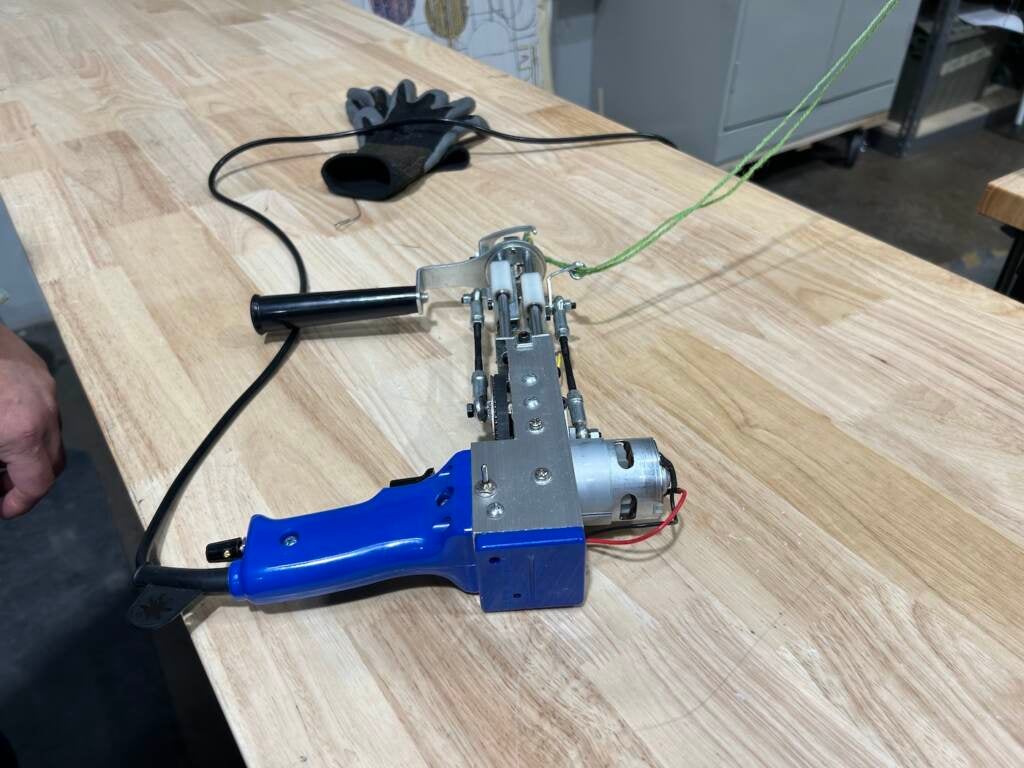
Turns out Tuft the World already had that garbage lying around.
“Often what happens is we get a box that it’s come all the way from China, it’s come in the shipping container, and it’s no longer usable,” Alexander said. “It’s either not structurally sound anymore or it’s just gotten dirty in a way that people don’t want. … This is a way for us to use it without throwing it out.”
The solution was the “machine that eats cardboard” – a gray metal machine a few feet long that fits on a tabletop.
Stick a flat piece of an old cardboard box in one end, and the machine perforates it in straight lines, making it easy to fold or roll, and wrap around products – in place of something like bubble wrap.
Alexander says using perforated old shipping boxes has allowed Tuft the World to avoid using 2 tons of fresh packing material just this year.

“Any time you’re taking a waste product and just changing a little bit and making it useful again, typically is better environmentally,” said Andrea Hicks, a professor in the Department of Civil and Environmental Engineering and director of sustainability education and research at the University of Wisconsin Madison. She studies the environmental impacts of products and technologies over their full life cycle.
Hicks says it’s hard to directly compare the impact of different packing materials — for example, shredded cardboard, expanded polystyrene, or those plastic air packs you get in a lot of online orders — without doing a case study that takes into account a bunch of factors. These include how the products are made, how far and by what means they travel to the businesses that use them, and how heavy they make packages when they’re in use, which could affect transportation emissions.
One thing you can look at is what happens to the materials after they’re used. Plastic air packs and expanded polystyrene are technically recyclable, Hicks said, but the problem is that few municipalities accept them.
“It’s hard because it puts the onus on the consumer,” she said. “They get this package, and if their curbside recycling doesn’t take it, the question is, what do you do?”
In Philly, you can’t throw bubble wrap, packing peanuts, or plastic bags in the city’s curbside recycling, but cardboard – even perforated or shredded – is recyclable.
Alexander and Eads wanted to take Tuft the World’s cardboard reusing plan to the next level. The business started collecting used cardboard boxes from other businesses in the building, and running them through their perforating machine.
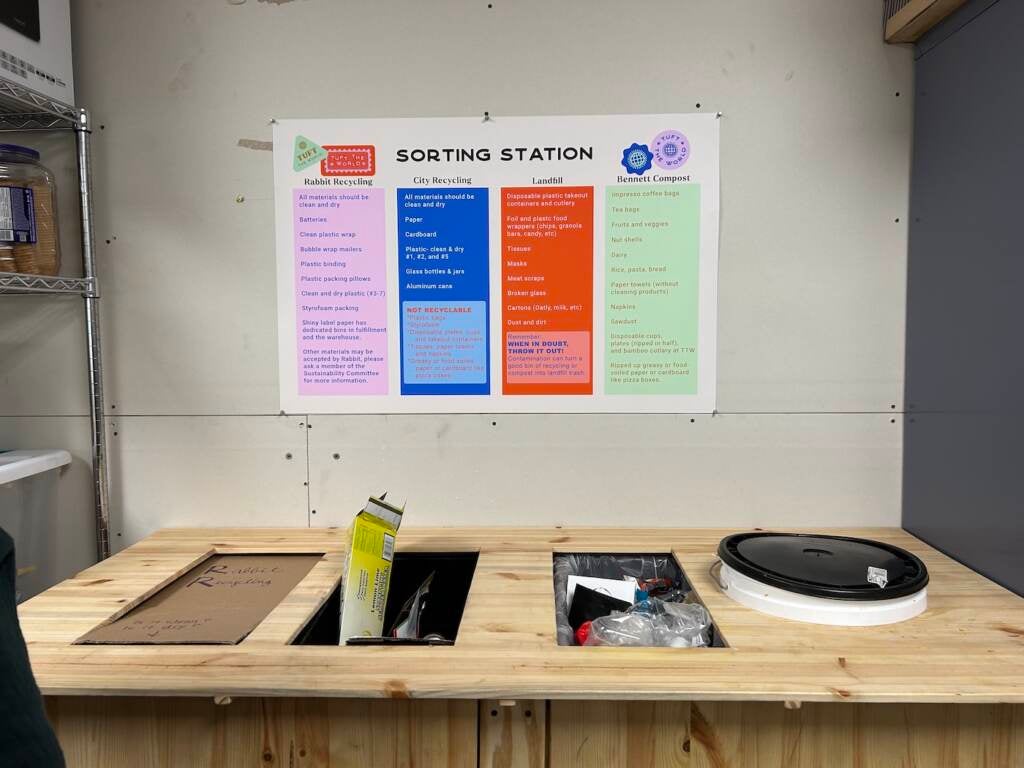
“It saves [the businesses] money, but it also means they’re not putting another seven, eight, nine, ten tons of garbage into a landfill every year,” Alexander said.
They also wanted to make reused packing material more accessible to other small businesses that might not be able to afford the equipment to make it themselves.
So Tuft the World recently launched a new spin-off business, called Shred the World, to commercially sell perforated cardboard as packing material. They plan to buy another machine to shred cardboard, so businesses can use it in place of packing peanuts to fill voids in boxes. And they have other ideas, like someday collecting used cardboard boxes from consumers.
“Part of changing the world for us – we have more power to change than an individual,” Alexander said.

Subscribe to PlanPhilly
WHYY is your source for fact-based, in-depth journalism and information. As a nonprofit organization, we rely on financial support from readers like you. Please give today.




